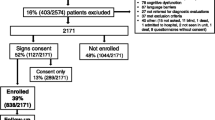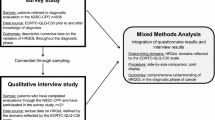Abstract
Purpose
This study examined the mediating effects of cancer type, treatment, and distress on health-related quality of life (HRQoL) for early diagnosis cancer patients. Results were interpreted with respect to established thresholds for clinical meaningfulness.
Methods
A cross-sectional design was used. Patients completed surveys collecting demographics, cancer type, treatment, comorbid conditions, distress (HADS), and HRQoL (FACT-G). Hierarchical multivariate regressions examined associations between cancer type, treatment, and distress on HRQoL. Established minimum differences were used to identify clinically meaningful changes in HRQoL.
Results
Of the 1183 patients surveyed, 21% were classified as having elevated anxiety and 13% had elevated depression. Our sample reported significantly lower physical and emotional well-being compared to population norms. Patients with prostate, melanoma, gynaecological, and urological cancers had higher HRQoL scores than those with colorectal cancer. However, when effects for treatment type and distress were considered, differences between cancer types became non-significant. Anxiety and depression were associated with lower HRQoL scores as was chemotherapy. Only depression, anxiety, and chemotherapy were associated with clinically meaningful decreases in HRQoL scores.
Conclusions
While statistically significant differences in HRQoL were found between different cancer types, only chemotherapy, anxiety, and depression produced clinically meaningful poorer HRQoL scores. In practice, clinically meaningful differences could promote a shift in resources toward interventions where a positive effect on patient well-being is appreciated by both the patient and health professional.

Similar content being viewed by others
References
Saban KL, Penckofer SM, Androwich I, Bryant FB (2007) Health-related quality of life of patients following selected types of lumbar spinal surgery: a pilot study. Health Qual Life Outcomes 5:71. https://doi.org/10.1186/1477-7525-5-71
Taphoorn MJB, Stupp R, Coens C, Osoba D, Kortmann R, van den Bent MJ, Mason W, Mirimanoff RO, Baumert BG, Eisenhauer E, Forsyth P, Bottomley A, Ncic CTG (2005) Health-related quality of life in patients with glioblastoma: a randomised controlled trial. Lancet Oncol 6(12):937–944. https://doi.org/10.1016/s1470-2045(05)70432-0
Efficace F, Bottomley A, Smit EF, Lianes P, Legrand C, Debruyne C, Schramel F, Smit HJ, Gaafar R, Biesma B, Manegold C, Coens C, Giaccone G, Van Meerbeeck J, Grp ELC, Quality Life U (2006) Is a patient’s self-reported health-related quality of life a prognostic factor for survival in non-small-cell lung cancer patients? A multivariate analysis of prognostic factors of EORTC study 08975. Ann Oncol 17(11):1698–1704. https://doi.org/10.1093/annonc/mdl183
Valderas JM, Kotzeva A, Espallargues M, Guyatt G, Ferrans CE, Halyard MY, Revicki DA, Symonds T, Parada A, Alonso J (2008) The impact of measuring patient-reported outcomes in clinical practice: a systematic review of the literature. Qual Life Res 17(2):179–193. https://doi.org/10.1007/s11136-007-9295-0
Bultz BD, Carlson LE (2013) A commentary on ‘Effects of screening for psychological distress on patient outcomes in cancer: a systematic review’. J Psychosom Res 75(1):18–19. https://doi.org/10.1016/j.jpsychores.2013.04.002
Wilson IB, Cleary PD (1995) Linking clinical variables with health-related quality of life: a conceptual model of patient outcomes. J Am Med Assoc 273(1):59–65. https://doi.org/10.1001/jama.273.1.59
Ferrans CE, Zerwic JJ, Wilbur JE, Larson JL (2005) Conceptual model of health-related quality of life. J Nurs Scholarsh 37(4):336–342. https://doi.org/10.1111/j.1547-5069.2005.00058.x
Detmar SB, Muller MJ, Schornagel JH, Wever LDV, Aaronson NK (2002) Health-related quality-of-life assessments and patient-physician communication - a randomized controlled trial. Jama-Journal of the American Medical Association 288(23):3027–3034. https://doi.org/10.1001/jama.288.23.3027
Granger CL, McDonald CF, Berney S, Chao C, Denehy L (2011) Exercise intervention to improve exercise capacity and health-related quality of life for patients with non-small cell lung cancer: a systematic review. Lung Cancer 72(2):139–153. https://doi.org/10.1016/j.lungcan.2011.01.006
Jansen L, Koch L, Brenner H, Arndt V (2010) Quality of life among long-term (> = 5 years) colorectal cancer survivors - systematic review. Eur J Cancer 46(16):2879–2888. https://doi.org/10.1016/j.ejca.2010.06.010
Mols F, Vingerhoets A, Coebergh JW, van de Poll-Franse LV (2005) Quality of life among long-term breast cancer survivors: a systematic review. Eur J Cancer 41(17):2613–2619. https://doi.org/10.1016/j.ejca.2005.05.017
Porter MP, Penson DF (2005) Health-related quality of life after radical cystectomy and urinary diversion for bladder cancer: a systematic review and critical analysis of the literature. J Urol 173(4):1318–1322. https://doi.org/10.1097/01.ju.0000149080.82697.65
Lee CK, Stockler MR, Coates AS, Gebski V, Lord SJ, Simes RJ, Australian New Zealand Breast C (2010) Self-reported health-related quality of life is an independent predictor of chemotherapy treatment benefit and toxicity in women with advanced breast cancer. Br J Cancer 102(9):1341–1347. https://doi.org/10.1038/sj.bjc.6605649
Reeve BB, Potosky AL, Smith AW, Han PK, Hays RD, Davis WW, Arora NK, Haffer SC, Clauser SB (2009) Impact of cancer on health-related quality of life of older Americans. J Natl Cancer Inst 101(12):860–868. https://doi.org/10.1093/jnci/djp123
Zebrack BJ, Yi J, Petersen L, Ganz PA (2008) The impact of cancer and quality of life for long-term survivors. Psycho-Oncology 17(9):891–900. https://doi.org/10.1002/pon.1300
Popovic M, Lao N, Zeng L, Zhang L, Cella D, Beaumont JL, Chow R, Chiu N, Chiu L, Lam H, Poon M, Chow E (2013) The impact of clinical and sociodemographic features on quality of life in patients with early stage cancers using the functional assessment of cancer therapy-general assessment tool. Support Care Cancer 21(8):2267–2277. https://doi.org/10.1007/s00520-013-1789-4
Bedard G, Zeng L, Lam H, Cella D, Zhang LY, Lauzon N, Chow E (2012) Meaningful change in oncology quality-of-life instruments: a systematic literature review. Expert Review of Pharmacoeconomics & Outcomes Research 12(4):475–483. https://doi.org/10.1586/erp.12.34
Askew RL, Xing Y, Palmer JL, Cella D, Moye LA, Cormier JN (2009) Evaluating minimal important differences for the FACT-melanoma quality of life questionnaire. Value Health 12(8):1144–1150. https://doi.org/10.1111/j.1524-4733.2009.00570.x
Eton DT, Cella D, Bacik J, Motzer RJ (2006) A brief symptom index for advanced renal cell carcinoma. Health Qual Life Outcomes 4:68. https://doi.org/10.1186/1477-7525-4-68
Eton DT, Cella D, Yount SE, Davis KM (2007) Validation of the functional assessment of cancer therapy - lung symptom index-12 (FLSI-12). Lung Cancer 57(3):339–347. https://doi.org/10.1016/j.lungcan.2007.03.021
Osoba D, Rodrigues G, Myles J, Zee B, Pater J (1998) Interpreting the significance of changes in health-related quality-of-life scores. J Clin Oncol 16(1):139–144
Maringwa J, Quinten C, King M, Ringash J, Osoba D, Coens C, Martinelli F, Reeve BB, Gotay C, Greimel E, Flechtner H, Cleeland CS, Schmucker-Von Koch J, Weis J, Van Den Bent MJ, Stupp R, Taphoorn MJ, Bottomley A, Project EP, Brain C (2011) Minimal clinically meaningful differences for the EORTC QLQ-C30 and EORTC QLQ-BN20 scales in brain cancer patients. Ann Oncol 22(9):2107–2112. https://doi.org/10.1093/annonc/mdq726
Maringwa JT, Quinten C, King M, Ringash J, Osoba D, Coens C, Martinelli F, Vercauteren J, Cleeland CS, Flechtner H, Gotay C, Greimel E, Taphoorn MJ, Reeve BB, Schmucker-Von Koch J, Weis J, Smit EF, van Meerbeeck JP, Bottomley A, Project EP, Lung Canc G (2011) Minimal important differences for interpreting health-related quality of life scores from the EORTC QLQ-C30 in lung cancer patients participating in randomized controlled trials. Support Care Cancer 19(11):1753–1760. https://doi.org/10.1007/s00520-010-1016-5
Deyo RA, Battie M, Beurskens A, Bombardier C, Croft P, Koes B, Malmivaara A, Roland M, Von Korff M, Waddell G (1998) Outcome measures for low back pain research - a proposal for standardized use. Spine 23(18):2003–2013. https://doi.org/10.1097/00007632-199809150-00018
Cella D, Hahn EA, Dineen K (2002) Meaningful change in cancer-specific quality of life scores: differences between improvement and worsening. Qual Life Res 11(3):207–221. https://doi.org/10.1023/a:1015276414526
Janda M, DiSipio T, Hurst C, Cella D, Newman B (2009) The Queensland cancer risk study: general population norms for the functional assessment of cancer therapy-general (FACT-G). Psycho-Oncology 18(6):606–614. https://doi.org/10.1002/pon.1428
ABS (2013) Socio-economic indexes for areas (SEIFA), 2011. vol 2033.0.55.001. Australia Bureau of Statistics, Canberra
Zigmond AS, Snaith RP (1983) The hospital anxiety and depression scale. Acta Psychiatr Scand 67(6):361–370. https://doi.org/10.1111/j.1600-0447.1983.tb09716.x
Sellick SM, Crooks DL (1999) Depression and cancer: an appraisal of the literature for prevalence, detection, and practice guideline development for psychological interventions. Psycho-Oncology 8(4):315–333. https://doi.org/10.1002/(sici)1099-1611(199907/08)8:4<315::aid-pon391>3.0.co;2-g
Quintana JM, Padierna A, Esteban C, Arostegui I, Bilbao A, Ruiz I (2003) Evaluation of the psychometric characteristics of the Spanish version of the hospital anxiety and depression scale. Acta Psychiatr Scand 107(3):216–221
Morse R, Kendell K, Barton S (2005) Screening for depression in people with cancer: the accuracy of the hospital anxiety and depression scale. Clin Eff Nurs 9(3–4):188–196. https://doi.org/10.1016/j.cein.2006.08.012
Singer S, Kuhnt S, Gotze H, Hauss J, Hinz A, Liebmann A, Krauss O, Lehmann A, Schwarz R (2009) Hospital anxiety and depression scale cutoff scores for cancer patients in acute care. Br J Cancer 100(6):908–912. https://doi.org/10.1038/sj.bjc.6604952
Cella DF, Tulsky DS, Gray G, Sarafian B, Linn E, Bonomi A, Silberman M, Yellen SB, Winicour P, Brannon J, Eckberg K, Lloyd S, Purl S, Blendowski C, Goodman M, Barnicle M, Stewart I, McHale M, Bonomi P, Kaplan E, Taylor S, Thomas CR, Harris J (1993) The functional assessment of cancer-therapy scale - delevopment and validation of the general measure. J Clin Oncol 11(3):570–579
Kwon IG, Ryu E, Noh GO, Sung YH (2012) Health-related quality of life in cancer patients between baseline and a three-year follow-up. Eur J Oncol Nurs 16(2):131–136. https://doi.org/10.1016/j.ejon.2011.05.004
Petrick JL, Reeve BB, Kucharska-Newton AM, Foraker RE, Platz EA, Stearns SC, Han XS, Windham BG, Irwin DE (2014) Functional status declines among cancer survivors: trajectory and contributing factors. J Geriatr Oncol 5(4):359–367. https://doi.org/10.1016/j.jgo.2014.06.002
Linden W, Vodermaier A, MacKenzie R, Greig D (2012) Anxiety and depression after cancer diagnosis: prevalence rates by cancer type, gender, and age. J Affect Disord 141(2–3):343–351. https://doi.org/10.1016/j.jad.2012.03.025
Choi EP, Wong CK, Tsu JH, Chin WY, Kung K, Wong CK, Yiu MK (2016) Health-related quality of life of Chinese patients with prostate cancer in comparison to general population and other cancer populations. Support Care Cancer 24(4):1849–1856. https://doi.org/10.1007/s00520-015-2980-6
Davis JW, Kuban DA, Lynch DF, Schellhammer PF (2001) Quality of life after treatment for localized prostate cancer: differences based on treatment modality. J Urol 166(3):947–952. https://doi.org/10.1016/s0022-5347(05)65870-3
Rannestad T, Skjeldestad FE, Platou TF, Hagen B (2008) Quality of life among long-term gynaecological cancer survivors. Scand J Caring Sci 22(3):472–477. https://doi.org/10.1111/j.1471-6712.2007.00557.x
World Health Organization (1990) Cancer pain relief and palliative care. Report of a WHO Expert Committee. World Health Organ Tech Rep Ser 804:1–75
The ACTION Study Group (2017) Health-related quality of life and psychological distress among cancer survivors in Southeast Asia: results from a longitudinal study in eight low- and middle-income countries. BMC Med 15(1):10. https://doi.org/10.1186/s12916-016-0768-2
Cheville AL (2009) Cancer-related fatigue. Phys Med Rehabil Clin N Am 20(2):405−+. https://doi.org/10.1016/j.pmr.2008.12.005
Jefford M, Ward AC, Lisy K, Lacey K, Emery JD, Glaser AW, Cross H, Krishnasamy M, McLachlan SA, Bishop J (2017) Patient-reported outcomes in cancer survivors: a population-wide cross-sectional study. Support Care Cancer 22(22):3171–3179. https://doi.org/10.1007/s00520-017-3725-5
Acknowledgements
We would like to acknowledge contributions from Dr. Mariko Carey and Dr. Sandra Ieropoli for developing the survey tool and overseeing data collection. We would also like to acknowledge the contribution of Ms. Helen Farrugia, Head of the Victorian Cancer Registry. We give our thanks and respect to the time and effort our survey participants gave to the project.
Funding
Funding for this study was provided by the Cancer Council Victoria (institutional funding).
Author information
Authors and Affiliations
Corresponding author
Ethics declarations
All procedures performed in studies involving human participants were in accordance with the ethical standards of the institutional and/or national research committee and with the 1964 Helsinki declaration and its later amendments or comparable ethical standards. Informed consent was obtained from all individual participants included in the study.
Conflict of interest
The authors declare that they have no conflicts of interest.
Additional information
Publisher’s note
Springer Nature remains neutral with regard to jurisdictional claims in published maps and institutional affiliations.
Electronic supplementary material
ESM 1
(DOCX 32.8 kb)
Rights and permissions
About this article
Cite this article
Marco, D.J.T., White, V.M. The impact of cancer type, treatment, and distress on health-related quality of life: cross-sectional findings from a study of Australian cancer patients. Support Care Cancer 27, 3421–3429 (2019). https://doi.org/10.1007/s00520-018-4625-z
Received:
Accepted:
Published:
Issue Date:
DOI: https://doi.org/10.1007/s00520-018-4625-z




